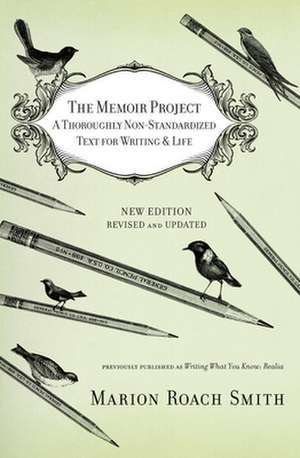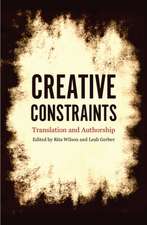The Memoir Project: A Thoroughly Non-Standardized Text for Writing & Life
Autor Marion Roach Smithen Limba Engleză Paperback – 8 iun 2011
Did you know that the #1 thing that baby boomers want to do in retirement is write a book--about themselves? It's not that every person has lived such a unique or dramatic life, but we inherently understand that writing a memoir--whether it's a book, blog, or just a letter to a child--is the single greatest path to self-examination.
Through
the
use
of
disarmingly
frank,
but
wildly
fun
tactics
that
offer
you
simple
and
effective
guidelines
that
work,
you
can
stop
treading
water
in
writing
exercises
or
hiding
behind
writer's
block.
Previously
self-published
under
the
title,Writing
What
You
Know:
Raelia,
this
book
has
found
an
enthusiastic
audience
that
now
writes
with
intent.
While
there
have
been
other
writing
books,
there's
nothing
like
Marion
Roach
Smith'sTHE
MEMOIR
PROJECT.
Preț: 95.21 lei
Nou
Puncte Express: 143
Preț estimativ în valută:
18.22€ • 19.02$ • 15.04£
18.22€ • 19.02$ • 15.04£
Carte disponibilă
Livrare economică 25 martie-08 aprilie
Preluare comenzi: 021 569.72.76
Specificații
ISBN-13: 9780446584845
ISBN-10: 0446584843
Pagini: 128
Dimensiuni: 133 x 203 x 13 mm
Greutate: 0.11 kg
Editura: Grand Central Publishing
Colecția Grand Central Publishing
ISBN-10: 0446584843
Pagini: 128
Dimensiuni: 133 x 203 x 13 mm
Greutate: 0.11 kg
Editura: Grand Central Publishing
Colecția Grand Central Publishing
Notă biografică
Marion Roach Smith, co-founder of TheSisterProject.com, has taught a sold-out class called "Writing What You Know" since 1998. She is the author of The Roots of Desire: The Myth, Meaning and Sexual Power of Red Hair (Bloomsbury, 2005); co-author with Michael Baden, M.D., of Dead Reckoning (Simon and Schuster, 2001); and author of Another Name for Madness (Houghton Mifflin, Pocket Books, 1986).
She is a former staff member of the New York Times and has written for the New York Times Magazine, Martha Stewart Living, Prevention, New York Daily News, Vogue, Newsday, Good Housekeeping, Discover , and American Health. Marion has been a commentator on National Public Radio's All Things Considered, and writes and records daily and weekly spots on Martha Stewart Living Radio, Sirius 112/XM 157.
She is a former staff member of the New York Times and has written for the New York Times Magazine, Martha Stewart Living, Prevention, New York Daily News, Vogue, Newsday, Good Housekeeping, Discover , and American Health. Marion has been a commentator on National Public Radio's All Things Considered, and writes and records daily and weekly spots on Martha Stewart Living Radio, Sirius 112/XM 157.
Recenzii
Smith
(The
Roots
of
Desire,
2006,
etc.)
helps
kick-start
the
writing
process.
Everybody has a story to tell. Some people dream of putting their stories in a book while others want to blog, write letters or record family history. Smith, who is also a workshop teacher, gives the honest nuts and bolts of memoir writing. She does not use standard and stale exercises or prompts to fill the pages of this slim volume, but rather a blend of anecdotes and unusual tips to help would-be writers "vomit up a draft." What makes this guide stand out from the rest is its complete lack of academic posturing. Smith does not constantly drop famous names or drone on about Paris. Instead, the author uses real, plainspoken examples from her life and writing, such as the memorable story of her mother's struggle with Alzheimer's. Seasoned writers should proceed with caution: Anyone who has taken Composition 101 will have heard much of this advice before, such as "write what you know" and "show, don't tell." But readers looking for a push in the right direction will find Smith's instructions highly accessible and inspiring. Her first-person narrative style is breezy and friendly, and the beginning lays out the three overarching rules for memoir writing. Chapters have catchy subtitles, with easy-to-understand examples, from how to choose a subject to style to editing. Other advice includes a list of go-to reference materials and how to navigate writing about sex.
Spare but practical resource for beginners--a good reference for library programs or community workshops.
—Kirkus Reviews
Everybody has a story to tell. Some people dream of putting their stories in a book while others want to blog, write letters or record family history. Smith, who is also a workshop teacher, gives the honest nuts and bolts of memoir writing. She does not use standard and stale exercises or prompts to fill the pages of this slim volume, but rather a blend of anecdotes and unusual tips to help would-be writers "vomit up a draft." What makes this guide stand out from the rest is its complete lack of academic posturing. Smith does not constantly drop famous names or drone on about Paris. Instead, the author uses real, plainspoken examples from her life and writing, such as the memorable story of her mother's struggle with Alzheimer's. Seasoned writers should proceed with caution: Anyone who has taken Composition 101 will have heard much of this advice before, such as "write what you know" and "show, don't tell." But readers looking for a push in the right direction will find Smith's instructions highly accessible and inspiring. Her first-person narrative style is breezy and friendly, and the beginning lays out the three overarching rules for memoir writing. Chapters have catchy subtitles, with easy-to-understand examples, from how to choose a subject to style to editing. Other advice includes a list of go-to reference materials and how to navigate writing about sex.
Spare but practical resource for beginners--a good reference for library programs or community workshops.
—Kirkus Reviews





